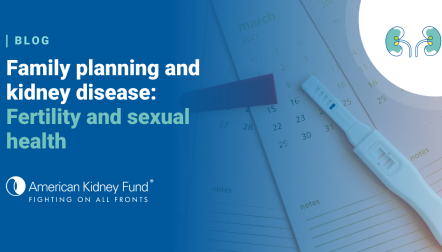
Blog post
Emerging innovations in kidney disease research: The Kidney Project, xenotransplantation and the Kidney Precision Medicine Project

This past March, the American Kidney Fund (AKF) hosted its fifth annual Kidney Action Week ™, a weeklong, free virtual conference for patients, caregivers, health professionals and researchers with a series of sessions related to kidney disease. Each day of sessions focused on a theme including Living Well with Kidney Disease, Prevention and Awareness through Community Action, and Navigating the Path to Kidney Health Equity. The week wrapped up with sessions focused on Kidney Innovation. The panel, which included renowned nephrologists, shared their research and projects that are shaping the future of chronic kidney disease care.
The Universal Donor Kidney (Bioartificial Kidney)
Kicking things off, Dr. William Fissell presented on his work with The Kidney Project, a national research project based out of the University of California at San Francisco. Dr. Fissell is an associate professor in the Division of Nephrology and Hypertension at Vanderbilt University and the medical director of The Kidney Project. The goal of The Kidney Project is to create a small, surgically implanted and free-standing bioartificial kidney.
The process of developing an artificial kidney is no small feat, but Dr. Fissell explained that the first step was understanding what functions it needs to perform. While our kidneys perform 12 different functions, he believes that all but two can be replaced with medicines. Therefore, the artificial kidney only needs to be able to control the fluid volume in the body and get rid of waste products.
Their device has two parts: a filter and a bioreactor. The filter will use tiny particles of silicon to create a thin sheet that only some substances, like water, can pass through. This will filter the blood, removing waste products, just like a kidney does. The bioreactor is a small container with lab-grown kidney cells, and it will be responsible for concentrating the waste products into a manageable amount of urine (pee).
This ambitious solution to kidney failure has faced challenges. However, researchers have continued to solve these problems, including growing functional kidney cells in the lab, which Dr. Fissell explains had not been done before.. They have also scaled the device down so it can fit inside the body. The first model of their device has been successfully implanted into a pig and created urine.
The future of the universal donor kidney is bright, and Dr. Fissell believes that clinical trials (implanting the device in humans) could happen within five years. The two main components, the filter and the bioreactor, have been shown to work together as intended in animals, but more development is needed before they move to clinical trials. When the artificial kidney is approved for clinical trials, it will undergo multiple rounds of trials before it is approved for use by the Food and Drug Administration (FDA).
Xenotransplantation
Dr. Robert A. Montgomery, professor and chairman of the department of surgery, and director of the NYU Langone Transplant Institute, presented on the advances of xenotransplantation.
Xenotransplantation is the transplant of an organ from one species to another. In this case, an organ from a pig to a human. These organs, such as kidneys or hearts, come from pigs that were bred in laboratories, using DNA from other pigs. This process is called cloning and is done because the selected pig DNA has been changed by scientists to make it more compatible with human DNA. This is all done to make sure that the transplanted pig organ is not attacked by the human body, a process known as organ rejection.
Dr. Montgomery also explained the role that xenotransplantation could play in ending the organ shortage. In the United States, which has some of the highest organ transplant rates over 89,000 men, women, and children are on the national transplant waiting list for a kidney. As of March 2024 only 27,332 of them received a kidney. This is why an unlimited, sustainable supply of organs is needed. Pig organs could be a possible solution to the shortage.
In 2021, Dr. Montgomery's team successfully transplanted gene-altered pig kidneys into human patients who were brain dead (when the brain no longer works but the heart is continuing to keep the body alive). The transplanted kidneys were monitored for three days, and during this time, urine was produced, making the trial a success. Most recently, in March of 2024, a 62-year-old Massachusetts man received the first genetically modified pig kidney transplant. Unfortunately, he passed about two months later due to causes unrelated to the transplant. In May of 2024, Lisa Pisano was the second person to receive a kidney from a gene modified pig. Unfortunately, due to issues with her heart causing injury to the kidney, it was removed after 47 days, and Lisa is back on dialysis. She is stable and the transplant enabled her to receive a life-prolonging heart pump.
Xenotransplantation is an exciting field, often in the headlines, and Dr. Montgomery believes that within the next few years, larger clinical trials will begin.
Kidney Precision Medicine Project
Dr. Christine Limonte, an assistant professor and researcher at the University of Washington in the division of nephrology and alumni of AKF's Clinical Science in Nephrology (CSN) program, presented on the Kidney Precision Medicine Project.
Precision medicine is a personalized treatment for each patient. For kidney disease patients, this means understanding the cause of their chronic kidney disease (CKD) and treating that cause directly. The Kidney Precision Medicine Project is a multi-year collaboration of several universities and medical centers that gather data to develop this kind of treatment for CKD.
The process begins by collecting kidney biopsies, samples of kidney tissue, from people with CKD that would not otherwise receive a biopsy. This includes patients with diabetic kidney disease (DKD) and CKD attributed to hypertension (high blood pressure). This biopsy is then examined for proteins and genes related to a clinical outcome, such as a decline in kidney function. In doing so, the researchers hope to say, "You have this specific kind of diabetic kidney disease, and it requires this specific kind of treatment."
The project is hoping to better understand mechanisms behind acute kidney injury (AKI) and CKD, down to the molecular level. This means understanding what is happening inside of kidney disease cells and how that is related to kidney disease or injury. They also hope to find biomarkers, which could be proteins, fats or other small substances, that are present in CKD cases. Finding these would allow for more non-invasive procedures. They also hope that their data will lead to clinical trials for precision treatments of CKD. Dr. Limonte also explained that the project is "people-centered," and they are sharing their data as widely as possible, so that any researcher can access it for their own work.
The Kidney Precision Medicine Project currently has a total of 289 participants, 210 of those people have CKD, and 62 have an AKI. In addition, 17 people are enrolled in this study who have a history of diabetes, but no CKD. They are known as diabetic kidney disease "resistors," and the hope is to compare their biopsies to samples from people with DKD. Similarly, there are 35 people enrolled without CKD who act as a comparison group.
Dr. Limonte believes that precision medicine is the future, particularly for those with CKD. If you are interested in learning about joining the project, you can visit their website: The Kidney Precision Medicine Project.
You can watch these sessions and more from Kidney Action Week.
These are just a few of the exciting innovations in the kidney care field right now! AKF is proud to connect these researchers with the kidney community, and to be a part of these advances.





